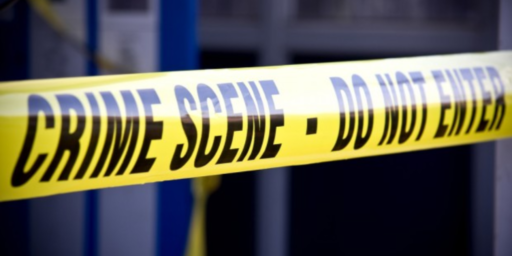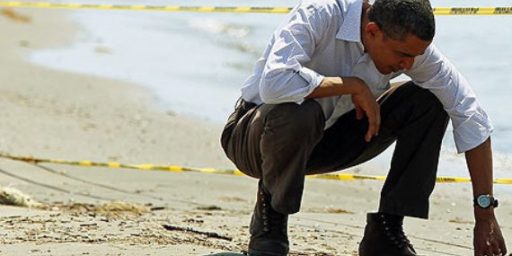The Limitations of Government
The politics of the oil spill keep rattling around in my head (yes, I should probably have that checked) and I have been contemplating a post on the subject for several days to go beyond what I wrote in my post, Is Oil Spill becoming Obama’s Katrina? I have a number of disparate and/or inchoate thoughts on the subject, but the main theme that runs through them all is that this event simply demonstrates the limitations of government followed by the fact that we, as a country, have highly contradictory views about what we expect from our government (to the point of cognitive dissonance in some cases). For example, anyone over the last couple of years who has been calling for “limited government” and/or brandishing terms like “socialism” and who yet also think that the government ought to be able to fix this situation lickity-split have some serious logical issues that need to be sorted out.
What, for example, would the political fall-out have been if the first year of the Obama administration that he suggested that billions be invested in preparing for massive oil spills given the prevalence of off-shore drilling? Somehow I don’t think it would’ve flown.
This is not to say, by the way, that there are not real criticisms to be leveled at the government’s response (there always are). Nor is it to say that the president won’t take a political hit over all of this (they always do).
However, the fundamental issue here is that this is a case that demonstrates a) the limitations of regulation and/or the need for more/better ones, and b) that sometimes mistakes of monumental proportions gets made when people are involved.
Further, this is also a case of what the libertarian-wing of the GOP says that they want: let business do its thing, and if it screws up, make them fix it and pay for it. It also shows that the government is not omnipotent.
Beyond all of that, I think that David Brooks pretty much hit the nail on the head when he said the following on The News Hour last week in regards to Obama’s response:
DAVID BROOKS: Well, he could do better theater maybe. And he held a press conference yesterday. And he probably should have held that a couple weeks ago. And he probably should have had made daily press conferences, as Bobby Jindal did during Katrina or Rudy Giuliani did after 9/11.
And, so, that would have been nice, if he had maybe explained more or showed more theater. But that wouldn’t have closed the hole at the bottom of the ocean.
[…]
DAVID BROOKS: The government has certain jobs. And part of the job is to regulate the oil industry, so this thing doesn’t happen as much as it could.
Part of the job is to help people who are hurting who are in those industries, who are in those towns, who are in the restaurants. That’s clearly part of the government’s job. And the government’s job is to oversee BP to close the hole.
But BP has an incredible incentive to close that hole. There is nothing — they have no incentive to let it keep open. So, I’m not sure I personally blame President Obama because that hole is still open.
That last point is rather important: every day that this spill continues, BP faces massive losses. They have every reason to want it stopped and stopped now.
The major problems here are that a) there are no proven technologies that exists to stop this leak and, b) whatever technologies that do exist are in private (not government) hands.
Mostly I hear people who want the President to “do something” (but we aren’t sure what), or that we need “the best minds” assembled (like this is an episode of Star Trek or something) or simply that the president emote more (basically Maureen Dowd’s argument or Mark Shields’ in the PBS piece from whence came the Brooks’ quotes).
It seems to me that we have hear a monumental disaster for which there is no immediate and simple solution and that it has be addressed in that fashion.







Personally I don’t think the president can do anything. I think our culture demands it-and I think mostly what it demands is good theatre and not necessarily that the president got out there and personally close the hole.
The one giant government failure I see was in giving BP the pass on the inspections and allowing some of the safety stuff to slide. I don’t think this is a personal Obama failure, but it is certainly a government failure that didn’t need to be a failure. The oversight rules were there, and BP was allowed to forego them for the time being and that turns out to have been a mistake.
I don’t expect the government to be superman, I do expect the government to fulfill its oversight duties and I also hope the government will do what it can at this point to foster the oil spill being stopped and the oil that is in the gulf cleaned up.
No amount of regulation is going to absolutely prevent accidents nor will it ever be able to fix them. Scientific and engineering problems are notoriously resistant to empathy and how much anyone cares about them. These problems are about reality, not perception, and reality isn’t something official Washington does very well.
Exactly.
I think it’s really a reflection of what’s happened to politics in this country. When something serious happens we spend more time assigning blame than actually dealing with the problem. Can you imagine if the attack on Pearl Harbor had happened in the current political climate ?
No, it won’t. But is is clear that the Bush administration willfully destroyed regulatory functions for the oil industry, (unless taking gifts from the supposedly regulated and watching porn are somehow part of proper regulation).
It is also clear that BP willfully ignored all sorts of red flags with this project. This was probably a preventable accident.
Not at all…
Well, let me admit in this exact case we should not look to the government to plug the damn hole simply because nobody in Gov has those skills.
But your larger point is dead wrong.
The whole purpose of government is to do that which the individual cannot. I can quite easily say that I don’t want the government to record the body mass index of children but I do want them to solve real problems that private citizens can not.
To say that if you want the government to clean up the spill you have to be for the nationalization of the heath care system is patently silly.
No. It. Isn’t.
anjin-san – Bush. Bush! BUSH!!. Jumpin’ Jeebus, it gets old after a while, and even if you are correct what the hell has the Obama Administration been doing for 16 months? Anyway, almost all accidents are preventable with the benefit of hindsight.
Anjin-san, grow up and get over Bush. Why don’t you go back and whine about all the sleazy things that happened under Clinton?
Steven, of course the govt is limited in many ways, but not so much in the ability to redistribute wealth and implement terrible policy.
For example, anyone over the last couple of years who has been calling for “limited government†and/or brandishing terms like “socialism†and who yet also think that the government ought to be able to fix this situation lickity-split have some serious logical issues that need to be sorted out.
Not at all. From my vantage point the accusations of socialism have been inspired mainly by Obama’s stated desire for income redistribution and not from any efforts to increase the quantity or quality of public goods that government delivers.
What, for example, would the political fall-out have been if the first year of the Obama administration that he suggested that billions be invested in preparing for massive oil spills given the prevalence of off-shore drilling? Somehow I don’t think it would’ve flown.
Of course your conclusion follows from the premises you’re working with, but if your premises are incorrect, which I suspect they are, then so too is your conclusion. There is nothing socialistic about emergency preparedness. In fact, considering that Obama and his propaganda agents were really pushing the “competence” angle during the campaign, an investment in emergency preparedness would have dovetailed with the call for better management and increased competence in the the work of government quite nicely.
Mostly I hear people who want the President to “do something†(but we aren’t sure what), or that we need “the best minds†assembled
Are you not aware of the effort made to assemble the best minds to address novel solutions to this problem has already been undertaken but then one of the best minds was dismissed from the panel because he wrote some politically incorrect essays on homosexuality? Playing identity politics and catering to identity sympathies is a political act, not an act that reflects well on taking a problem seriously or managing a crisis competently.
Clinton was an excellent President and his tenure was a very good time for this country. I can look past his failings as a person. If I want a moral example I have Mother Theresa.
Hmmm. Dealing with the economic train wreck that Bush left on his doorstep? The war Bush was losing in Afghanistan? Look, I know you guys just want to close your eyes and pretend the horrific Bush Presidency never happened, but it is not that simple. We are stuck crawling from the wreckage.
They are also preventable if you listen to warnings from your engineers and preform all the testing you are supposed to.
I agree with charles. There shouldn’t be any regulations on anything so that way the oil companies will be free to drill the safest way possible without big gov’t looking over their shoulder which will obviously result in no accidents occurring because the freemarket will keep that from happening
There’s a hole in the ocean
Dear Barack, dear Barack,
There’s a hole in the ocean
Dear Barack, a hole.
matt — is English your first language? I only ask, because I didn’t say anything at all like what you want to agree with.
I’m not so sure. There’s a difference between the way the world ought ought work, and how to fix problems in the world today. If the legal standard BP and other oil companies had to follow were strict liability, BP would spend a lot of money making sure no drop of oil ever escaped into the ocean. However operating in the real world — with some amount of limited liability, heavy regulation, and the Oil Pollution Act of 1990 in which the government willingly put itself on the hook for the cleanup of certain massive disasters, apparently partly to guarantee a domestic supply of oil — I think it’s entirely rational to say that the government should have been better prepared for this kind of problem. It’s also rational to say that (1) BP should have checked if it had the ability it thought it had to handle a disaster, and (2) every oil company that operates anywhere in the US is now reviewing or will soon review their disaster recovery plans.
According to BP’s Oil Spill Regional Plan, the company believed it had resources to handle a spill 10 times larger than this one. Clearly that has not panned out as expected ( http://climateaudit.org/2010/05/30/the-bp-oil-spill-response-plan/ ).
Milton Friedman’s son once said (about a different issue):
Please note: I personally have no idea how long plugging this hole should take. I see no reason to believe federal workers would have done a better job over the last month and a half than BP’s employees. And I’m certainly not out making the case for more government intervention for future problems.
“That last point is rather important: – every day that this spill continues, BP faces massive losses. They have every reason to want it stopped and stopped now.”
IIRC, BP didn’t want to spring for a half-million $ blow-out preventer, because it’d cost too much. This is when dealing with a situation where a major failure would be catastrophic, and very difficult to contain (a mile under the ocean, with tremendous pressure keeping the well open). They acted like people who didn’t give a d*mn, and won’t until the gallows trap drops under them (which I hope (a) will happen soon and (b) will be televised live, on HD TV).
charles austin says:
“anjin-san – Bush. Bush! BUSH!!. Jumpin’ Jeebus, it gets old after a while, and even if you are correct what the hell has the Obama Administration been doing for 16 months? ”
Trying to clean up the colossal mess left by the Bush administration. Tell ya what – I’ll come over to your house, and vandalize it. Let’s see how many days or weeks it takes you to fix one hour of vandalism.